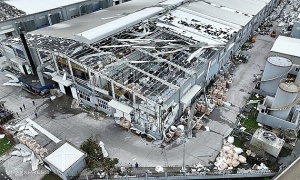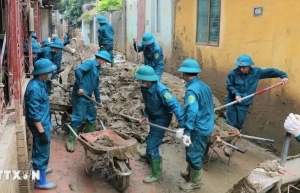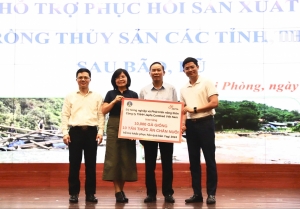Typhoon could change mindsets in insurance sector
FiinGroup’s assessment last week revealed that Typhoon Yagi caused severe flooding and infrastructure damage across 26 northern provinces, with Haiphong and Quang Ninh suffering the most, as total damages exceeded $3.26 billion, disrupting key sectors like agriculture, manufacturing, logistics, and tourism.
 |
| Typhoon could change mindsets in insurance sector, Source: freepik.com |
FiinGroup underscored the immense pressure the typhoon has placed on the insurance sector. “Typhoon Yagi has significantly strained the insurance industry, with early estimates of claims related to property damage and loss of life reaching trillions of VND, and still rising,” it noted.
This growing strain comes as Vietnam’s manufacturing sector saw its first contraction in September, following five consecutive months of expansion.
Andrew Harker, chief economist at S&P Global Market Intelligence, said, “Typhoon Yagi has delivered a substantial blow to Vietnam’s manufacturing industry, with widespread flooding and business closures causing significant supply chain disruptions.”
The typhoon claimed over 300 lives, left around 2,000 people injured, and destroyed or damaged around 235,000 homes, 1,500 schools, and numerous infrastructure projects. Additionally, over 307,000 hectares of crops and fruit trees were flooded. Livestock losses were staggering, with nearly three million animals lost, alongside 3,700 aquaculture farms impacted.
For insurers, the greatest risk stems from the non-life insurance sector, particularly as natural disasters grow more frequent and severe.
“Typhoon Yagi will significantly raise claims costs, especially for reinsurance firms like Vietnam National Reinsurance Corporation, the country’s largest reinsurer,” FiinGroup noted.
Despite the devastation, some insurance companies may benefit from a heightened awareness of the importance of coverage following such disasters. For example, Quang Ninh Coal Processing Company under state-owned Vinacomin, and Halong Plaza, a 4-star hotel under BIM Group, received early compensation payments from Vietnam Aviation Insurance Corporation (VNI).
These payments demonstrated the critical role insurance plays in mitigating unexpected losses, with business leaders praising VNI for its rapid response. By September 30, VNI had recorded nearly 1,200 claims related to Typhoon Yagi, including over 800 motor vehicle claims and around 380 property, technical, and marine cargo claims.
In the non-life insurance sector, loss estimation is generally straightforward for flooded assets, with businesses and households typically covered. However, more complex claims involving factories and large machinery require thorough assessments. Reinsurance standards also add complexity to the compensation process, particularly for large contracts involving international reinsurers.
A representative from Bao Viet Insurance Group noted that their assessors had been on the ground to expedite provisional payments, ensuring that recovery efforts were not delayed. “In addition to our own assessors, we also bring in independent third parties to ensure accurate damage assessments,” the representative said.
However, damage assessment post-typhoon remains challenging, particularly in areas where communication and transportation infrastructure have been heavily damaged. Assessors often face flooded, dangerous conditions, further slowing the inspection process.
In property and motor vehicle insurance, losses extend beyond physical damage to assets, including indirect costs such as lost revenue and recovery expenses. An industry expert said, “Non-life insurers in Vietnam have been slower to adopt technology for loss assessment, still relying heavily on physical inspections, which prolongs the claims process.”
Typhoon Yagi also hit small businesses hard, with many suffering devastating losses. Ngo Trung Dung, deputy secretary general of the Insurance Association of Vietnam, said, “Small business owners typically do not have the habit of proactively managing risks through insurance, which leaves them unprotected when disasters strike.”
Tran Nguyen Dan, a lecturer at the University of Economics in Ho Chi Minh City, emphasised that comprehensive asset risk insurance for apartments remains uncommon in Vietnam.
“Most apartment buyers rely on bank loans, and the bundled insurance products offered by banks often fail to meet customers’ actual needs,” he said. “Many people opt for compulsory fire insurance to minimise costs or feel pressured into purchasing life insurance as part of loan conditions. As a result, most apartment owners affected by Typhoon Yagi received no compensation, despite having insurance.”
Dan pointed out that the annual premium for comprehensive asset risk insurance is only around 3 per cent of the property’s value, a relatively small cost compared to potential losses. He urged individuals and banks to prioritise insurance products that genuinely meet customer needs, rather than treating insurance as a formality.
 | Manufacturing production suffers after Typhoon Yagi Typhoon Yagi had a significant impact on Vietnam's manufacturing sector in September, with heavy rain and flooding causing temporary business closures and delays across production lines and supply chains. |
 | Inflation takes focus to circumvent typhoon impact To prevent potential price hikes in the aftermath of Typhoon Yagi, the government has placed a stronger emphasis on controlling inflation, viewing it as key to ensuring the country’s economic growth targets for the year. |
 | Japfa Vietnam assists in typhoon recovery efforts Japfa Comfeed Vietnam Co., Ltd. (Japfa Vietnam) has reached out to customers and partners in northern provinces affected by Storm Yagi. |
 | Rebuilding lives a priority in aftermath of Typhoon Yagi In the wake of Typhoon Yagi, addressing the tragic consequences and rebuilding efforts has become paramount, with crucial bank support and strategic advice from industry experts guiding the process. |
What the stars mean:
★ Poor ★ ★ Promising ★★★ Good ★★★★ Very good ★★★★★ Exceptional
 Tag:
Tag:
Related Contents
Latest News
More News
- Shinhan Life Vietnam builds growth on people strategy (October 07, 2025 | 09:45)
- Insurance sector initiates rapid response after Typhoon Bualoi devastation (October 03, 2025 | 18:25)
- Non-life insurers face mounting pressure after typhoon hits motor sector (October 02, 2025 | 18:59)
- Prudential Vietnam delivers responsible investment package (September 25, 2025 | 10:37)
- Insurers struggle to keep pace with EV rapid adoption (August 29, 2025 | 17:12)
- Non-life insurance market in sees bright spots in H1 despite rising challenges (August 28, 2025 | 16:21)
- Life insurance rebounds with renewed growth and trust (August 06, 2025 | 18:04)
- Global Care launches Vietnam’s first insurance KOL platform (July 25, 2025 | 09:42)
- Liberty Insurance leaves mark at 2025 Insurance Asia Awards with dual wins (July 14, 2025 | 07:27)
- New CEO takes helm at Prudential Vietnam (July 07, 2025 | 17:51)




















 Mobile Version
Mobile Version